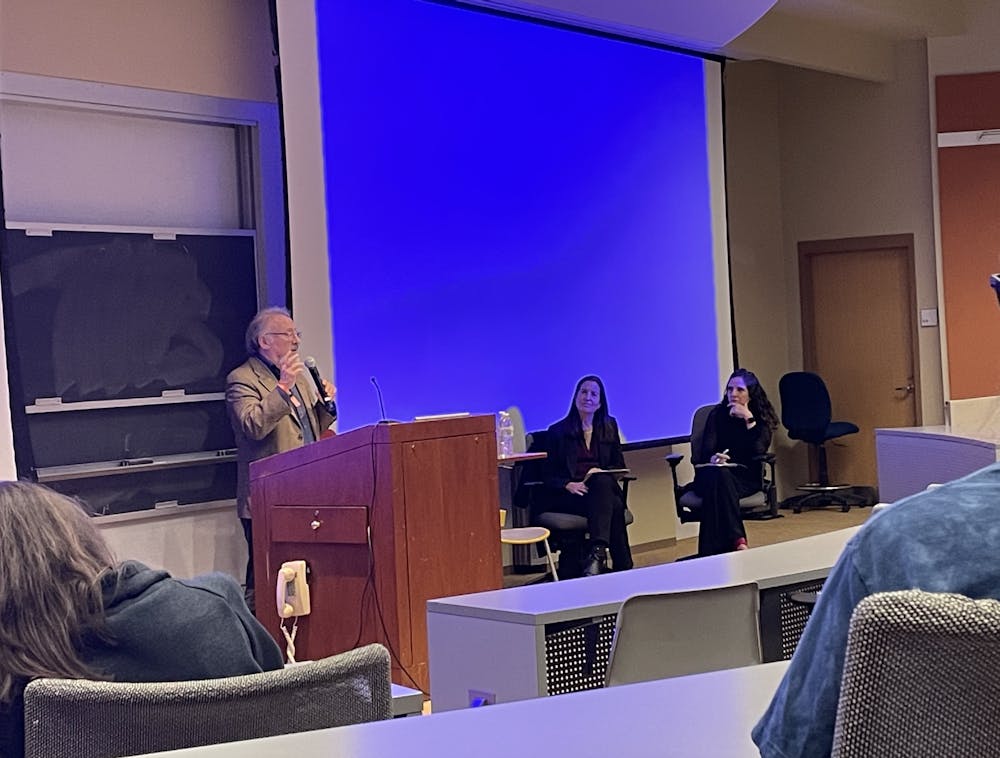The Program in Latin American, Caribbean and Latinx Studies (LACLxS) hosted “The 50th Anniversary of Chile’s Military Coup” on Sept. 28. The event featured Peter Kornbluh, a senior analyst at the National Security Archive, Katherine Hite, a professor of political science on the Frederick Ferris Thompson Chair at Vassar College and Consuelo Amat, an assistant professor of political science at the Stavros Niarchos Foundation (SNF) Agora Institute.
LACLxS Program Director Angelina Cotler discussed her reasons for organizing the event in an email to The News Letter.
“The main objective was to commemorate, remember and enlighten the audience about this tragic event, its consequences for Chilean society and the role the U.S. government at the time played in supporting the military coup,” Cotler wrote.
Kornbluh began the event with a presentation of declassified documents from the United States federal government that featured transcripts from telephone calls between President Richard Nixon and Former National Security Advisor Henry Kissinger. The papers described their efforts to assist Former General Augusto Pinochet in a military coup to overthrow democratically elected Former President of Chile Salvador Allende.
Kornbluh described the importance of raising awareness about these documents.
“[We have] our own words of what the U.S. role was, and that’s why these documents are so important. We have to keep feeding them into the ongoing discussion that continues in Chile and around the world — the existential struggle between the sanctity of democratic institutions and the encroaching and evermore dire threat of authoritarianism,” he said.
He later described the dangers of negacionismo, or denialism, a term commonly associated with misinformation or a refusal to acknowledge historical events. Misinformation has caused support for the late Pinochet to increase in recent years, as many pinochetistas (supporters of the military dictatorship) deny the fact that numerous human rights crimes were committed at the time.
Kornbluh went on to compare misinformation in Chile to that in the U.S.
“Chile is in the throes of disinformation campaigns that are very similar to what we see here,” he said. “Our own country is going through very similar types of debates, confronting very similar types of disinformation and lies. There are people who have tried to misconstrue, misrepresent and rewrite the history of [Jan.] 6th, saying that that wasn’t a coup at all.”
In an interview with The News-Letter, Graduate student Ugonna Okorie described her thoughts on the role of the U.S. in the coup and whether this culture of misinformation and imperialism has changed over time.
“I think there are more discussions [nowadays] on what [the U.S. political environment] can’t be. In the Nixon period, we talked a lot about the rise of neoliberalism, and that’s what was being taught in Chile as well. There are more demonstrations to protest that, and people are mobilizing to find more ways to fight against [neoliberalism], but generally, I do not [think the political environment has changed],” Okorie said.
Hite added on to the conversation. She spoke about the importance of remembering and propagating information about the 1973 Chilean coup d'état and the human rights crimes associated with the event. She described the Museo de la Memoria y los Derechos Humanos (Museum of Memory and Human Rights), which honors the victims of human rights violations during Pinochet’s military dictatorship.
“In recent decades, the Americas have witnessed a remarkable embrace of cultural memory and facing our violent past as a political and social force,“ she said. “Memory museums provide an institutional recognition that major political violence and systemic violations of human rights of the past cannot [disappear] like so many victims — no matter how distant that past [and] no matter how some may wish to bury the truth.”
She then discussed the importance of recognizing how violent pasts resonate in modern society — specifically the political and ideological undertones to past systemic human rights violations that affect the state of the nation today.
Hite spoke on how memorials like the Museum of Memory and Human Rights are able to combat this issue.
“Museums [expose] youth to the history of state terror and introduce them to human rights principles... This means making connections between human rights violations of the past and the ongoing structural marginalization and violence against the country’s citizens,” she said.
She went on to describe how, throughout Chilean history, leaders have consistently downplayed human rights and democracy as a means of furthering economic growth, a trend still apparent today. Acknowledging and remembering the past is risky for many Chilean politicians, many of whom correlate this event with a loss of political control. However, visitors to the Museum of Memory and Human Rights have increased considerably in number, encompassing more diverse crowds over time.
The event concluded with a panel discussion facilitated by Amat.
Freshman Sebastian Picht discussed the impact of the event on his understanding of the 1973 Chilean coup d'état.
“[The event] mostly solidified my perspectives [about the coup]. One of my bigger political interests is U.S. intervention — the fact that it’s still underrated, in terms of the attention that it gets, compared to the [negative] consequences that it has given the rest of the world,” he said. “The more you find out, the more [you realize how] horrible it is, but it empowers you to keep raising awareness.”





